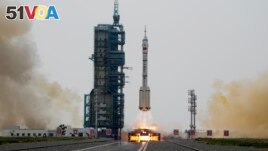31 May 2023
China's growing space program plans to put astronauts on the moon by 2030 and expand the country's orbiting space station, officials said earlier this week.
The announcement comes at a time of competition with the United States over space exploration and global issues.
The Chinese and U.S. competition is similar in some ways to the space race between the United States and the former Soviet Union in the 1960s and 1970s. However, experts say American spending, supply chains and abilities put it ahead of China -- for now.

A Long March rocket carrying a crew of Chinese astronauts in a Shenzhou-16 spaceship lifts off at the Jiuquan Satellite Launch Center in northwestern China, Tuesday, May 30, 2023. (AP Photo/Mark Schiefelbein)
The U.S. plans to land astronauts on the moon by the end of 2025. NASA is working with private companies SpaceX and Blue Origin to help with the moon landings.
China's space agency this week also introduced three astronauts heading to its space station. They will replace a crew that has been on the orbiting station for six months.
"We have a complete near-Earth human space station and human round-trip transportation system," said Lin Xiqiang, deputy director of the Chinese Manned Space Agency.
Lin added that a plan of two crewed missions a year should be enough for their program goals.
Reports say the Tiangong space station finished in November.
The Shenzhou 16 rocket will carry the three astronauts to the station. There, the team will briefly spend time with the other three astronauts who have lived on the station for the past six months.
Mission commander Jing Haipeng recently spoke to reporters at the launch site outside the northwestern city of Jiuquan. Jing said the mission marked "a new stage of application and development" in China's space program.
"We firmly believe that the spring of China's space science has arrived, and we have the determination, confidence, and ability to . . . complete the mission," said Jing, a major general who has already made three space flights.
China's first manned space mission in 2003 made it the third country to put a person into space.
China built its own space station after it was excluded from the International Space Station (ISS). This was largely because of U.S. objections to China's space program. The U.S. was worried about close connections between the program and the People's Liberation Army, the military part of the Chinese Communist Party.
Five partner organizations, including the European Space Agency and NASA, control the operations of the ISS.
The U.S. plans to land near the moon's south pole near the end of 2025. Scientists believe that area contains frozen water.
Both China and the U.S. are looking at plans to build permanent bases on the moon. This brings questions about rights and interests on the moon's surface.
American law does not permit much cooperation between the two countries' space programs. However, China says it welcomes foreign offers to work together on space projects.
Li Yingliang is the technology director of the Chinese crewed space flight agency. He said China hoped for more international collaboration, including with the U.S.
As long as the goal is to use space for peaceful purposes, Li said, "we are willing to cooperate and communicate with any country or aerospace organization."
Other organizations and countries, from India and the United Arab Emirates to Israel and the European Union, are also planning missions to the moon.
I'm Andrew Smith.
Andrew Smith adapted this story from reporting from The Associated Press.
___________________________________________________________________
Words in This Story
global -adj. relating to the whole Earth
introduce -v. to present or show a person, thing, or idea for the first time
application -n. the use of some device, process, or idea
determination -n. a strong will to do or something